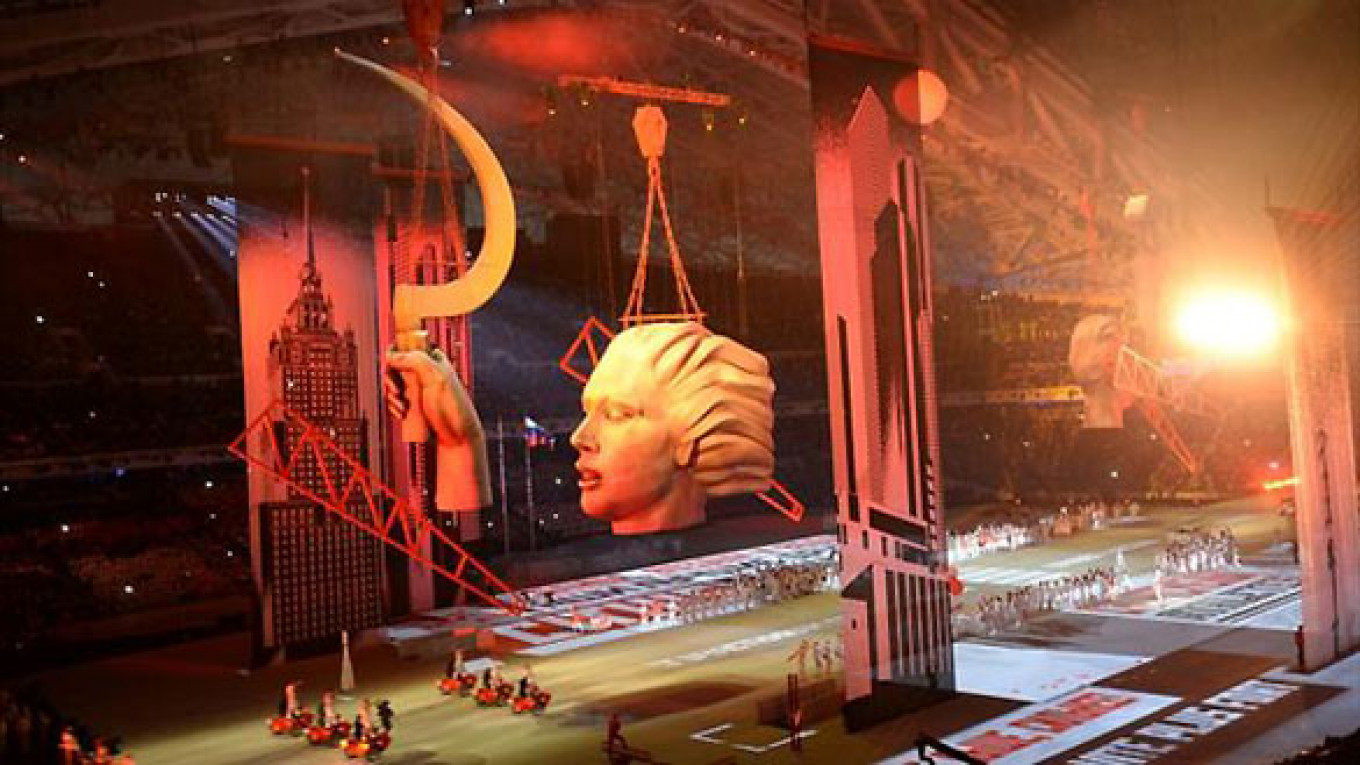The spectacular opening ceremony at the Sochi Olympics confounded Western critics who were expecting a bombastic display of Soviet nostalgia and muscular nationalism, a showcase for President Vladimir Putin's embrace of "traditional values."
Instead, viewers saw a whimsical, poetic and restrained paean to Russian high culture — art, music and ballet. The title was "Russia's Dreams." It was an impressive show, combining stunning special effects with old-fashioned sentimentality and emotion.
Westerners, who were prepared to see the Olympics as Putin's Games, seemed to have overlooked the surprising gap between the ceremony's idealized narrative and the "traditional values" that Putin has been trying to promote over the past few years.
Russian nationalists were confused and incensed by the ceremony. Where, they asked, was the reference to World War II, the clear centerpiece of Russian political identity? Blogger Chernosotenets complained that "The [early] Soviet period was shown as red combines grinding people." Why was the Leonid Brezhnev period represented by dancing, pony-tailed and smiling hipsters? And where was the past 20 years of post-Soviet history? Blogger kolobok1973 wrote: "There is no new Russia, the past 20 years did not exist. It melted away like a vision, a bad dream."
Instead, the spectacle showcased emigres such as writer Vladimir Nabokov, composer Alfred Schnittke and inventor Igor Sikorsky, who found success abroad, not inside Russia. The works of artist Kazimir Malevich or composer Igor Stravinsky's "Rit es of Spring," are little-known to ordinary Russians.
Nationalists complained that Putin had contracted out the country's national narrative to a cosmopolitan intellectual elite. Indeed, Vladimir Gomelsky, deputy director of state-controlled Channel One, explained that "Our ceremony was designed for an international audience." Producer Konstantin Ernst, general director of Channel One, insisted that the show was an "expression of love for our homeland" on behalf of "real Russians, untainted by decades of propaganda and the Cold War." But surely all those decades of propaganda and Cold War are part of Russian identity, for better or for worse.
It turns out that Ernst relied on international experts to script and stage much of the show. They included the New York-based George Tsypin, production designer for "Spiderman: Turn off the Dark," who presented a tableau of dancing puppets at the 2002 Venice Biennale. Costumes were designed by Kim Barrett, another "Spiderman" veteran. Two producers had worked on the London Olympics ceremony, three aerialist experts came from the Cirque du Soleil and a director of the Shanghai circus choreographed the gymnastics.
The special effects were themselves fabricated outside Russia. The flying troika came from Sweden, and the mascot puppets were made in Australia.
Journalist Olga Kabanova wrote in Vedomosti: "This has happened throughout Russian history. The main monuments were built by foreigners in accordance with an ideological commission."
According to arts critic Grigory Revzin, the disjunction between the ceremony and Putin's current policies is partly due to the fact that planning began three years ago — before the political protests of December 2011 and before Putin's big push toward conservative values. Andrei Malgin reported in The Moscow Times that the producers wanted to incorporate a commemoration of World War II, including a minute of silence, but this was nixed by International Olympic Committee officials.
The Sochi Olympics look set to be a resounding success and will undoubtedly boost Putin's standing on the international stage. The debate over the content of the opening ceremony may be little more than a storm in a samovar, but it does illustrate the continuing ambiguities around Russian political identity.
Peter Rutland is government professor at Wesleyan University in Middletown, Connecticut.
A Message from The Moscow Times:
Dear readers,
We are facing unprecedented challenges. Russia's Prosecutor General's Office has designated The Moscow Times as an "undesirable" organization, criminalizing our work and putting our staff at risk of prosecution. This follows our earlier unjust labeling as a "foreign agent."
These actions are direct attempts to silence independent journalism in Russia. The authorities claim our work "discredits the decisions of the Russian leadership." We see things differently: we strive to provide accurate, unbiased reporting on Russia.
We, the journalists of The Moscow Times, refuse to be silenced. But to continue our work, we need your help.
Your support, no matter how small, makes a world of difference. If you can, please support us monthly starting from just $2. It's quick to set up, and every contribution makes a significant impact.
By supporting The Moscow Times, you're defending open, independent journalism in the face of repression. Thank you for standing with us.
Remind me later.






